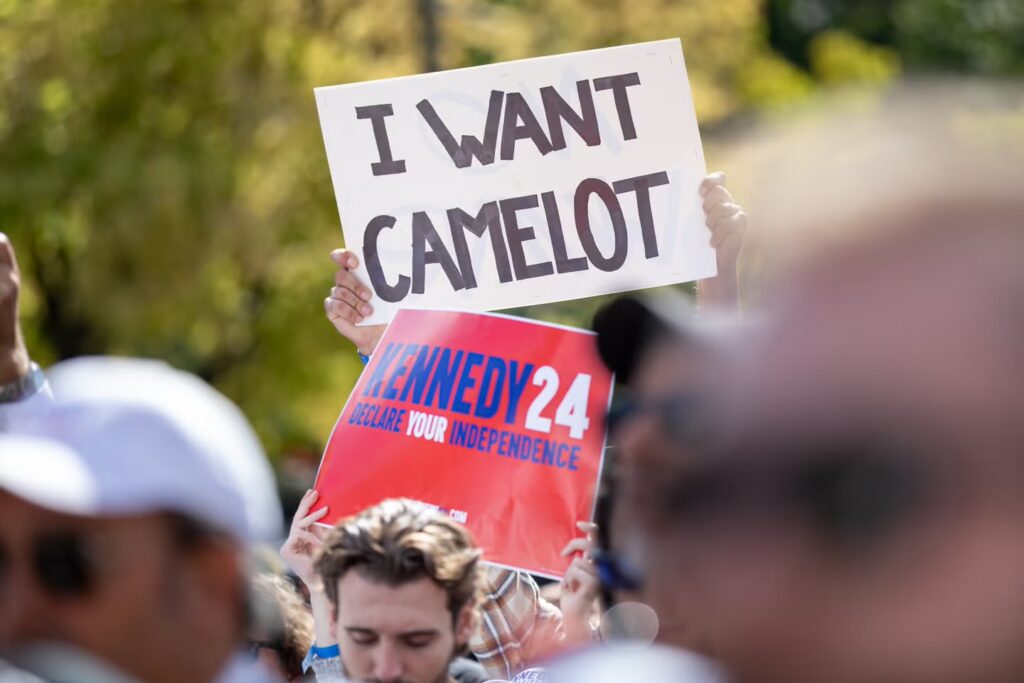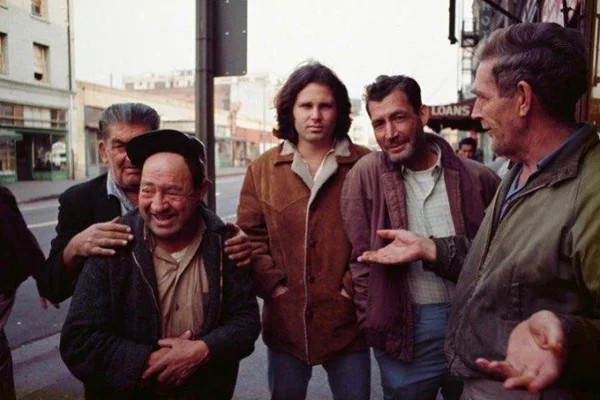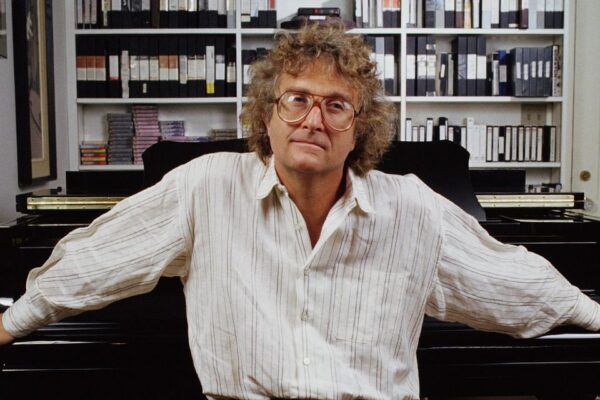Perhaps it will take the death of the last baby boomer—gasping, clinging to an overstuffed armchair and a cherished first edition of Profiles in Courage—to finally bury the myth of Camelot, a myth that has hovered over America for decades like a stubborn, misty apparition. It wasn’t a real place, of course, but that never stopped anyone from trying to find it, or worse, trying to resurrect it.
Camelot, that shiny kingdom of chiseled jawlines and wind-swept hair, has long been America’s favorite fairy tale. It began with John F. Kennedy and was nurtured by his widow, Jackie, who, in a fit of public relations genius (or desperation), likened her husband’s brief presidency to the noble court of King Arthur. This was immediately devoured by a nation hungry for pageantry, and it stuck, like bubblegum to the sole of a shoe.

Over the years, Americans have grown older, grayer, and fatter—but the fantasy of Camelot? Oh, it remained forever young. JFK in perpetual soft focus, standing on the bow of a sailboat, grinning like he knows a secret no one else does. But perhaps the real secret was this: Camelot was never Camelot. Not really. It was an illusion of youth, power, and hope wrapped up in expensive wool suits and clipped New England accents. And for a while, we all bought in. Who wouldn’t?
But time, ever the ruthless skeptic, has a way of wearing down even the sturdiest myths, and Camelot has been no exception. For every anniversary of JFK’s assassination or retrospective on 60 Minutes about Bobby Kennedy, there’s been a counterweight—usually another Kennedy scandal. They are, after all, America’s royal family, and what would a royal family be without scandal? From Chappaquiddick to drug busts, sex scandals, and now the unspeakable crime of social media madness, the Kennedy name has drifted far from the pristine shores of Camelot into the murky waters of a reality show marathon.
And yet, for decades, we clung to the idea that somehow, somewhere, a Kennedy could rise again, leading us back to that kingdom in the clouds where hope, youth, and optimism reign supreme. It’s almost sweet, this desperate belief in second (or third, or twelfth) chances. We watched with starry-eyed nostalgia as JFK’s offspring trotted through political races, waved from podiums, or, in the case of JFK Jr., posed shirtless for magazines. The faithful clung to the idea that somewhere, Camelot was simply in need of a little dusting off.

But now, alas, the myth has reached its tragicomic conclusion with the unmasking of Robert F. Kennedy Jr., who has managed to drive the final nail into the Kennedy political dynasty with all the grace of a carnival barker stumbling into a Shakespearean soliloquy. RFK Jr. started off as an environmental activist, which seemed like a Kennedy-adjacent thing to do, but somewhere along the way, he became what can only be described as a walking, talking conspiracy theory. And yet, here he was in 2024, announcing his bid for the presidency as if anyone, anywhere, had asked for it.
Perhaps the true absurdity lies in the spectacle of RFK Jr. staking his claim to the tarnished Camelot throne and, in the same breath, endorsing Donald Trump—a man whose connection to Camelot is about as real as his hair. It’s a bit like watching Don Quixote charge at a windmill, except in this version, the windmill is also tweeting anti-vaccine memes and selling “MAGA” hats.
Oh, what would Jack say now? One can almost picture him, lounging on some celestial yacht, shaking his head in bemusement. “Bobby, Bobby, Bobby,” he’d mutter, sipping a glass of Scotch and watching the whole sorry affair unfold like a bad episode of The Twilight Zone. “We tried so hard to get out, and now you’re dragging us back in.”
Even the Kennedy family, once united in their carefully crafted aura of invincibility, has distanced itself from RFK Jr. In their eyes, this isn’t just a political misstep; it’s a betrayal of the very myth they’ve spent decades nurturing. They’ve rejected him the way one might reject a bad toupee—hoping that, if they pretend hard enough, no one will notice the embarrassing spectacle unfolding in front of them. But it’s too late for that now. The illusion has shattered.
The Camelot myth, if we’re being honest, always contained a touch of magical realism—an impossible dream that could never quite hold up under the weight of history. It was easy to believe when JFK, looking like the second coming of a Greek god, spoke in his thick Bostonian accent about new frontiers and lunar landings. But as the decades wore on and the real-world Kennedys started to look more like the cast of Arrested Development than the Knights of the Round Table, the fantasy began to wear thin.
We are now left with the final act of this tragically absurd play, where the ghost of Camelot no longer whispers of greatness but shuffles along, hunched and hollow, mumbling incoherently about vaccines and global cabals. RFK Jr., with his tinfoil crown and scepter of pseudoscience, is not the king anyone asked for, but he is the one we deserve after years of clinging to a fantasy that should have been laid to rest long ago.
So, what will it take to finally put Camelot in the ground? Maybe it will take the last baby boomer dying—the last of those who remember where they were when JFK was shot, who remember Jackie’s pink suit, who still hold onto yellowed newspaper clippings of that fateful day in Dallas. Maybe it will take a final collective sigh, a nod to history, and the realization that Camelot, like all myths, belongs to the past. It served its purpose once, gave us something to believe in, but now it’s time to let it go.
And so, we stand at the edge of the grave, staring down at the tattered remains of a dream. Perhaps it’s time to leave Camelot where it belongs—not with a whimper, but whimpering, as RFK Jr. stumbles offstage and into the dustbin of history. Let the myth rest, unmarked, save for the memories of what could have been. And maybe, just maybe, the next time we go searching for heroes, we’ll look for them in the real world, not the fairy tale.
TONY CASTRO, the former award-winning Los Angeles columnist and author, is a writer-at-large and the national political writer for LAMonthly. org. He can be reached at tony@tonycastro.com.





